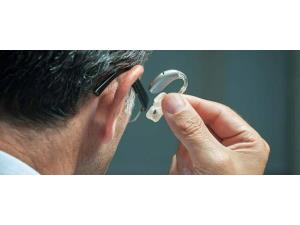



Date:02/04/21
 Co-led by Wolverhampton University and led by Edinburgh Napier University, the multidisciplinary research programme has been funded under EPSRC’s ‘Transformative Healthcare Technologies for 2050’ scheme.
Co-led by Wolverhampton University and led by Edinburgh Napier University, the multidisciplinary research programme has been funded under EPSRC’s ‘Transformative Healthcare Technologies for 2050’ scheme.
Around 12 million people in Britain suffer from hearing loss, which costs the NHS approximately £450m per year. By 2050 nearly 2.5 billion people globally are predicted to have some degree of hearing loss. Despite this, hearing aids uptake is as low as 40 per cent, and most people who have the device do not use it often enough.
Said to be inspired by human speech perception in everyday noisy situations, that usually require both aural and visual senses, the funded four-year Cognitively-Inspired 5G-IoT Enabled Multi‐Modal Hearing Aids (COG-MHEAR) programme is developing the world’s first multimodal hearing aids, designed to autonomously adapt to their surroundings, resulting in greater intelligibility and potentially reduced listening effort.
Dr Ahsan Adeel, the programme’s Research and Innovation deputy director from Wolverhampton University, said: “Our vision 2050 is to go beyond 5G-IoT and internet, for internet-independent ‘brain-like’ on-chip processing to further address hearing aid’s size, power budget, communication, and cybersecurity issues.
“This EPSRC programme will provide the UK with a timely opportunity to improve hearing aid uptake, reduce NHS cost, and gain a leading position in the future multimodal hearing aid industry.
“The visionary research represents a step-change in how healthcare will be delivered in future.”
“It is fantastic to be co-leading this programme into creating the next generation of hearing aids,” added Professor Amar Aggoun, dean of the Faculty of Science and Engineering. “The Faculty of Science and Engineering at Wolverhampton University is going from strength to strength with new facilities being invested in and research projects that make a truly positive impact, like this one will have, being undertaken by our researchers.”
The project partners include the Universities of Edinburgh, Glasgow, Manchester, and Nottingham as well as Heriot-Watt University and Sonova, Nokia Bell-Labs, Alpha Data, Digital Health & Care Institute, The Data Lab, and Action on Hearing Loss.
Multimodal hearing aids adapt to their surroundings
 Co-led by Wolverhampton University and led by Edinburgh Napier University, the multidisciplinary research programme has been funded under EPSRC’s ‘Transformative Healthcare Technologies for 2050’ scheme.
Co-led by Wolverhampton University and led by Edinburgh Napier University, the multidisciplinary research programme has been funded under EPSRC’s ‘Transformative Healthcare Technologies for 2050’ scheme.Around 12 million people in Britain suffer from hearing loss, which costs the NHS approximately £450m per year. By 2050 nearly 2.5 billion people globally are predicted to have some degree of hearing loss. Despite this, hearing aids uptake is as low as 40 per cent, and most people who have the device do not use it often enough.
Said to be inspired by human speech perception in everyday noisy situations, that usually require both aural and visual senses, the funded four-year Cognitively-Inspired 5G-IoT Enabled Multi‐Modal Hearing Aids (COG-MHEAR) programme is developing the world’s first multimodal hearing aids, designed to autonomously adapt to their surroundings, resulting in greater intelligibility and potentially reduced listening effort.
Dr Ahsan Adeel, the programme’s Research and Innovation deputy director from Wolverhampton University, said: “Our vision 2050 is to go beyond 5G-IoT and internet, for internet-independent ‘brain-like’ on-chip processing to further address hearing aid’s size, power budget, communication, and cybersecurity issues.
“This EPSRC programme will provide the UK with a timely opportunity to improve hearing aid uptake, reduce NHS cost, and gain a leading position in the future multimodal hearing aid industry.
“The visionary research represents a step-change in how healthcare will be delivered in future.”
“It is fantastic to be co-leading this programme into creating the next generation of hearing aids,” added Professor Amar Aggoun, dean of the Faculty of Science and Engineering. “The Faculty of Science and Engineering at Wolverhampton University is going from strength to strength with new facilities being invested in and research projects that make a truly positive impact, like this one will have, being undertaken by our researchers.”
The project partners include the Universities of Edinburgh, Glasgow, Manchester, and Nottingham as well as Heriot-Watt University and Sonova, Nokia Bell-Labs, Alpha Data, Digital Health & Care Institute, The Data Lab, and Action on Hearing Loss.
Views: 346
©ictnews.az. All rights reserved.Similar news
- Azerbaijani project to monitor disease via mobile phones
- Innovative educational system to be improved under presidential decree
- NTRC prolongs license of two TV and radio organizations for 6 years
- Azerbaijan establishes e-registry for medicines
- Azerbaijani museum introduces e-guide
- Nar Mobile opens “Nar Dunyasi” sales and service center in Siyazan city
- International conference on custom electronic services held in Baku
- OIC secretary general to attend COMSTECH meeting in Baku
- Azerbaijan develops earthquake warning system
- New law to regulate transition to digital broadcasting in Azerbaijan
- Azerbaijani State Social Protection Fund introduces electronic digital signature
- Intellectual traffic management system in Baku to be commissioned in December
- Tax Ministry of Azerbaijan started receiving video-addresses
- World Bank recommends Azerbaijan to speed up e-service introduction in real estate
- Azerbaijan to shift to electronic registration of real estate





















